
Mark Hirko, M.D., FACS, president, Putnam Hospital and Sharon Hospital in Sharon, Connecticut
(part of Nuvance Health)
670 Stoneleigh Ave., Carmel
845-279-5711
What was your path to becoming a hospital president?
“I started my health-care career as a double, board-certified peripheral vascular surgeon and general surgeon. I have served in various clinical and senior administrative positions, including chief of vascular surgery at Western Reserve Hospital, Western Pennsylvania Hospital and Baystate Medical Center; program director, general surgery residency at Western Reserve, Monmouth Medical Center”“RWJBarnabas Health, Vassar Brothers Medical Center; associate medical director, heart and vascular program, Baystate Medical Center; and chair of the department of surgery, Monmouth Medical Center”“RWJBarnabas Health. With each position, there was an increase in levels of oversight and responsibility.”
What makes Putnam Hospital distinctive?
“Putnam Hospital is the only hospital in Putnam County and the county”™s largest employer. Recognizing the need for a health-care facility, the community banded together in the early 1960s to raise the monies needed to build the hospital. Since its founding in 1964, Putnam Hospital has grown exponentially, providing innovative services while maintaining a strong sense of community and personalized care. Many of our employees live nearby and, as such, know and treat our patients like family.”
What are Putnam Hospital”™s specialties?
“Putnam Hospital is committed to providing safe, compassionate care to meet each of our patient”™s unique health-care needs. We are a 164-bed, acute-care hospital, offering innovative technologies and advanced bariatrics, general surgery, urology, ophthalmology, orthopedics and spine surgical services. In addition, we offer advanced pulmonary management, progressive labor/delivery and maternity care and a robust and renovated emergency department. Patients also count on Putnam Hospital for blood management, cardiac, cancer and stroke care and outpatient physical rehabilitation. We also provide psychiatric care, including a partial-hospitalization program and home for our GME-accredited psychiatry residency.”
Increasingly, hospitals are becoming part of health-care systems. What are the advantages of such networks?
“The Covid-19 pandemic is just one example of the advantages of being associated with a larger system. We have been able to balance the load among our seven facilities, moving the most seriously ill to tertiary care centers and the reverse, transferring recovering or less ill patients to facilities with reduced service capabilities. Another example is cardiac and stroke management. We are able, through telehealth, to evaluate patients, diagnose any conditions, stabilize them and then transfer them to a tertiary facility for definitive care if necessary. Then, after discharge, patients return to our care for services we can offer, such as physical/occupational/speech therapies, cardiac rehabilitation, post-discharge imaging and lab testing. Finally, the ability to leverage service line care, such as oncology, neurosciences and heart and vascular, are all areas in which smaller, community facilities have a difficult time in recruiting specialists to their regions. Having the larger system allows these specialists to rotate to the communities in which we serve, utilizing technology, including telemedicine, to see patients, offer acute/chronic consultations and render follow-up management.”
What do you see in the future for Putnam Hospital?
“Putnam Hospital has a bright future. We need to retool and reinvest in a facility in which care is mostly ambulatory. (Outpatient care accounts for almost 75% of current health care.) Most hospitals were built in an era where care was primarily hospital-based. By working as a “cog” within a larger system, we will be able to increase primary care, develop behavioral care support systems and programs, increase outpatient surgical procedures, further integrate our emergency department with primary/specialty care services, develop a systemwide women”™s health program, increase oncology service capabilities and more. This allows for increasing efficient care, improving patient outcomes and, most important, maintaining a safe, health-care environment for the communities we have the pleasure of serving.”
For more, visit nuvancehealth.org/locations/putnam-hospital.






















